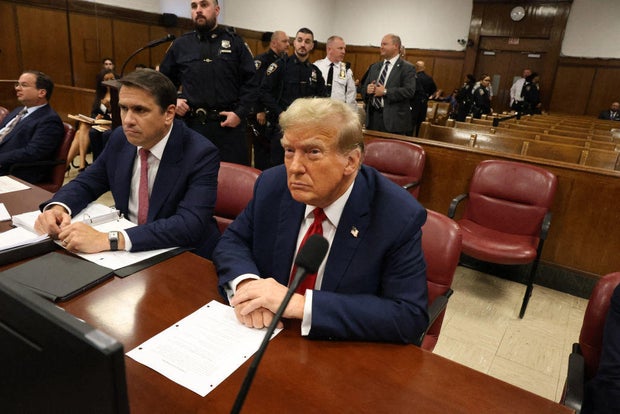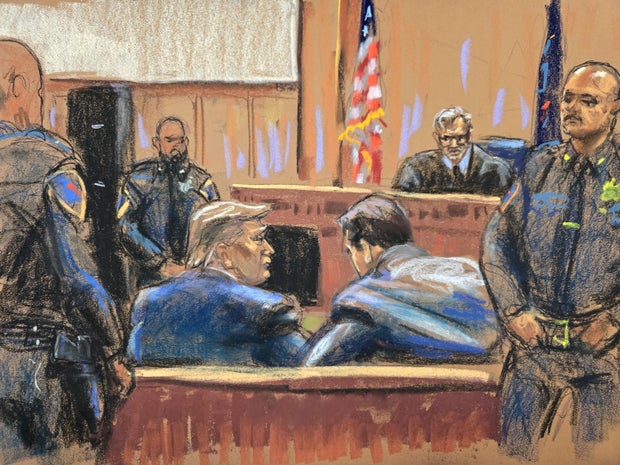The first criminal trial of a former president in U.S. history officially got underway Monday in a crowded Manhattan courtroom, where prosecutors and defense attorneys began the arduous task of seating a 12-person jury in the case of The People of the State of New York v. Donald J. Trump.
Flanked by his attorneys in room 1530 of the Manhattan Criminal Court, Trump was seated at a table where countless defendants before him have appeared. Monday’s proceedings started with lawyers for both sides arguing over several aspects of the case, including what evidence should be admissible and what questions should be asked of potential jurors.
The first 96 out of several hundred New York residents who make up the jury pool were sworn in just after 2 p.m., formally marking the beginning of the historic trial. More than half were quickly dismissed after they said they could not be fair and impartial. A handful of others said they could not serve for reasons that were not disclosed. Others were excused based on their answers to a questionnaire.
Trump is charged with 34 state counts of falsifying business records related to a “hush money” payment his attorney made to adult film star Stormy Daniels before the 2016 election. He has pleaded not guilty to all charges, claiming the prosecution is part of a plot by Democrats aimed at preventing him from retaking the White House. The case is the first of the four criminal prosecutions against Trump to make it to trial.
The presumptive Republican nominee for president addressed reporters outside the courtroom before making his way inside.
“This is really an attack on a political opponent. That’s all it is,” Trump said. “So I’m very honored to be here.”
The first day of the Trump trial
Judge Juan Merchan took his seat on the bench just before 10 a.m. and called the proceedings to order. He quickly denied a motion from Trump’s legal team asking him to recuse himself from the case. Trump’s attorneys had argued that Merchan should step aside because of his daughter’s employment at a consultancy firm that does work for Democratic candidates and progressive groups. Merchan said their argument relied upon “a series of inferences, innuendos and unsupported allegations.”
Trump’s lawyers and prosecutors from Manhattan District Attorney Alvin Bragg’s office moved on to arguments over a handful of outstanding issues related to evidence, rules for the trial and the questions that potential jurors would answer.
Joshua Steinglass, a member of Bragg’s team, said the prosecution would offer evidence that Trump conspired with his former attorney Michael Cohen and an executive at the parent company of the National Enquirer to suppress damaging stories about Trump, and publish negative stories about his rivals, before the 2016 election.
Steinglass said David Pecker, then the CEO of American Media, Inc., would testify that “he ran these stories to bolster Mr. Trump’s campaign” and that they were “shown to Mr Trump before they were published, so he could approve, suggest or reject changes.” Steinglass said prosecutors would introduce evidence pointing to “a deal struck between the defendant and AMI to put their thumbs on the scale.”
Todd Blanche, an attorney for Trump, said the evidence has “nothing to do with the charged crime.” Merchan sided with prosecutors, saying he would allow prosecutors to use the evidence at trial. The judge also said he would allow evidence related to Karen McDougal, a former Playboy model who also alleged an affair with Trump and sold the rights to her story to the National Enquirer.
Other rulings went in the defense’s favor. Merchan reiterated a previous decision barring the infamous Access Hollywood tape, in which Trump can be heard talking about grabbing women, from being played for the jury. He also disallowed a recording of Trump discussing the tape during a deposition.
Later, prosecutors indicated they would ask the judge why Trump shouldn’t be held in contempt for apparent violations of a gag order that Merchan imposed weeks ago. The order limits what Trump can say publicly about many of those involved in the case, including potential witnesses. Trump has attacked two well-known key witnesses, Cohen and Daniels, in social media posts since Merchan issued his order. Prosecutors asked the judge to hand down a fine of $1,000 each for three Trump posts and order that they be taken down. Merchan said he would hear arguments over the issue next week.
At several points during the arguments, Trump appeared to fall asleep at the defense table, his chin briefly dropping to his chest. In one instance, he was stirred awake by his attorney, Blanche, who touched his shoulder and spoke to him.
The jury selection process
Once the final pretrial questions were resolved, 96 of the more than 500 total members of the jury pool were escorted into the courtroom.
Merchan began by laying out the allegations against Trump, namely that he “falsified business records to conceal an agreement with others to unlawfully influence the 2016 presidential election.” He continued by mentioning Cohen and Daniels.
“Specifically, it is alleged that Donald Trump made or caused false business records to hide the true nature of payments made to Michael Cohen, by characterizing them as payment for legal services rendered pursuant to a retainer agreement,” Merchan said. “The [prosecutors] allege that in fact, the payments were intended to reimburse Michael Cohen for money he paid to Stephanie Clifford, also known as Stormy Daniels, in the weeks before the presidential election to prevent her from publicly revealing details about a past sexual encounter with Donald Trump.”
More than 50 jurors said they could not be fair and impartial and were told they could leave. Court personnel then began asking the roughly three dozen others to answer 42 additional questions ranging from the mundane — what jobs they hold — to the more pointed, like whether they follow Trump on social media. A handful of jurors were dismissed based on their answers. One woman said she could not put aside her views of Trump. Another man was excused because his child was getting married in June.
The process is expected to take at least a week, and likely longer. Trump’s lawyers and prosecutors will seek to whittle the group of potential jurors down to just 12, plus half a dozen alternates. Once jury selection is over, the two sides will then begin presenting their cases, with the prosecution going first.
As a criminal defendant, Trump is required to attend proceedings each day of the trial unless he applies for and is granted a waiver. Court personnel and lawyers from both sides have said they expect the trial to last between six and eight weeks.
Merchan reminded Trump that he must be in court every day of the trial, and issued a standard warning given to all criminal defendants that he will be subject to arrest if he fails to show up. At the end of the day, the judge denied Trump’s request to let him attend arguments next week before the Supreme Court over his claim of presidential immunity in one of his federal cases.
“Arguments before the Supreme Court [are] a big deal. It’s an important thing. I could certainly appreciate why your client wants to be there. But having a trial in New York County Supreme Court … is also a big deal and it’s important that your client be here in person. He’s a criminal defendant facing the indictment,” Merchan said. “I will see him here next week.”


